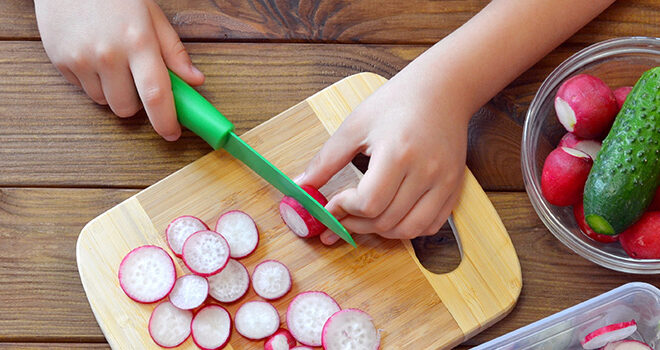Learning to cook at a very young age has a positive impact on neophobia. Furthermore, learning to cook has a long-term effect: it fosters knowledge and skills that help build good eating habits. Read about one of the conclusions of the EPICALIM study in Canada.
To increase the love of vegetables in children, it is important that they be exposed to vegetables frequently and at a very young age. For several years, the Louis Bonduelle Foundation has raised awareness about the health benefits of vegetables at all ages. Today’s challenge is to convince the more reluctant consumers to eat vegetables every day.
To do this, the Foundation conducted different studies to learn how to reach children, improve their perception of vegetables and overcome obstacles, in particular food neophobia, to ensure long-term familiarisation.
One of the studies was jointly conducted with the Institut de Tourisme et d’Hôtellerie du Québec (ITHQ) in Montreal, Canada. The research team of Laurine Thiriet and Pauline Fernandez (ITHQ), and Eloïse Castagna and Laurence Depezay (Louis Bonduelle Foundation), evaluated the mid-term impact of cooking workshops on the cooking ability of children. The results are very positive!
EPICALIM: the art and ways of changing eating behaviour in children
All the studies that tested different activities are practically unanimous: those activities that most effectively increase the consumption of vegetables in children are those that combine different types of actions. The EPICALIM research brings together three studies, which gather both on-the-ground and theoretical data. It provides a solid base of knowledge for the effectiveness of prevention techniques. The joint research with the ITHQ focuses on the impact of cooking practices.
The goal of the research was to evaluate the transmission and acquisition of 3 cooking skills in 52 children aged around 11:
- handling kitchen knives
- applying cooking techniques
- following a recipe
The team compared several cooking workshops conducted by different facilitators. The team measured their impact on the children’s ability to cook by evaluating children’s knowledge, their attitude in the kitchen and their sense of autonomy, both before and following the workshop, as well as a month afterwards.
All our articles about children and vegetables
Several transmission modes to learn how to cook
Different transmission modes to teach cooking skills were used by the organisers, with varying degrees of attention depending on each one:
- information, for example on the product’s origin
- instructions, for example on how to use the cooker
- demonstration of techniques
- explanation
- hygiene, nutrition and safety
First observation: the different teaching techniques used by the organisers did not modify the results. Second observation: regardless of the cooking workshop scenario, workshops significantly increase cooking knowledge, attitude and autonomy in children.
A month later, the level of knowledge remained the same, but the sense of autonomy and positive attitude had significantly decreased. As a result, it is important to repeat the experience over time to reinforce familiarisation.
EPICALIM shows that learning to cook is probably one of the key steps to improving children’s eating behaviour and undoubtedly one of the most effective approaches towards accepting meals composed of vegetables and plant-based foods at a very young age.
Want to learn more? Discover our new scientific monograph: How to ensure children eat more vegetables? The keys to implement the best actions.
Discover our delicious recipes for young and old alike!



 Purslane
Purslane  Chard
Chard  Vegetable garden: growing button mushroom
Vegetable garden: growing button mushroom 









